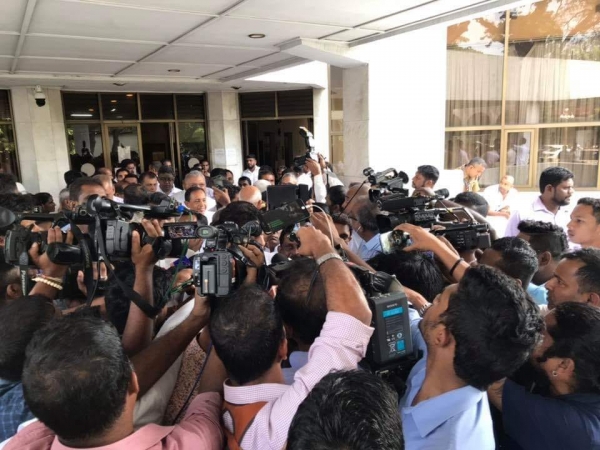Strong arguments were presented in the Supreme Court today in favour of the petitions filed against President Maithripala Sirisena's decision to prematurely dissolve Parliament.
The hearing took place before a three-judge bench, presided over by Chief Justice Nalin Perera.
K. Kanagiswaran PC, appearing for Opposition Leader R. Sampanthan, stated in his submissions that a proclamation cannot be made under Art. 70(5) as it is only a consequential provision - and has to come under 70(1), which the President has not done
Viran Corea, appearing on behalf of Centre of Policy Alternatives and its Executive Director Paikiasothy Saravanamuttu said the President’s actions affect the voters Right to Franchise and sought a stay order against the proclamation by President Sirisena.
Jayampathy Wickremaratne, in his submissions, explained the rules of Constitutional Interpretation and added intention of the framers of the law must be considered to interpret the law harmoniously. He also said the article 33(2)(c) should not be interpreted in a way that conflicts with 70(1)
Explaining the separation of powers, Counsel M. A. Sumanthiran said that as per our Constitution, each organ of government is supreme in its own sphere: "There are checks and balances between them, and one cannot extinguish the other in this manner," he said, during the hearing.
Sumanthiran also pointed out that if 33(2)(c) was a standalone provision the President could prorogue Parliament indefinitely without abiding by the limitations in Article 70. But reading 33(2)(c) this way, he said, could lead to a major abuse of power.
"What if the President doesn’t like the Prime Minister’s face? Does that mean he can dissolve Parliament?" Sumanthuran asked.
JC Weliamuna, appearing on behaldf of the JVP, said the 19th Amendement gave more powers the to legislature,which has a direct mandate from the people. Reminds the court that lawyers have taken an oath to defend the Constitution, not justify its violation. "the sun is setting on the constitution," he noted.
Geoffrey Alagaratnam PC added that an article of the Constitution cannot be read in isolation or in a manner that creates absurdity. If that were possible, he said, the President can dissolve Parliament the day after it is elected.
Ikram Mohamed PC, appearing for the SLMC said Article 33(1)(a) ensures the President is duty bound to respect and uphold the constitution. S
Counsel Hejaaz Hizbullah, appearing for Elections Commission member Prof. Ratnajeevan Hoole, asked how Article 70(5) mentioned in Proclamation can stand alone in disregard of 70(1).
Hizbullah also sought a stay order pending the final determination, as "large costs" are associated with the election. He went on to add, "Right to Franchise isn't only about holding elections but also about respecting the choices of the people made in previous elections.
The Attorney General requested more time for his submissions and therefore the hearing was adjourned till tomorrow 10 am.










